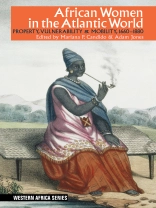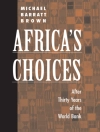An innovative and valuable resource for understanding women’s roles in changing societies, this book brings together the history of Africa, the Atlantic and gender before the 20th century. It explores trade, slavery and migrationin the context of the Euro-African encounter.
HONORABLE MENTION FOR AFRICAN STUDIES REVIEW BEST AFRICA-FOCUSED ANTHOLOGY OR EDITED COLLECTION, 2019
While there have been studies of women’s roles in African societies and of Atlantic history, the role of women in Westand West Central Africa during the period of the Atlantic slave trade and its abolition remains relatively unexamined. This book brings together scholars from Africa, North and South America and Europe to show, for the first time, the ways in which African women participated in economic, social and political spaces in Atlantic coast societies. Focusing on diversity and change, and going beyond the study of wealthy merchant women, the contributors examine the role of petty traders and enslaved women in communities from Sierra Leone to Benguela. They analyse how women in Africa used the opportunities offered by relationships with European men, Christianity and Atlantic commerce to negotiate their social and economic positions; consider the limitations which early colonialism sought to impose on women and the strategies they employed to overcome them; the factors which fostered or restricted women’s mobility, both spatially and socially; and women’s economic power and its curtailment.
Mariana P. Candido is an Associate Professor of History at the University of Notre Dame; Adam Jones recently retired as Professor of African History and Culture History at the University of Leipzig.
In association with The Institute for Scholarship in the Liberal Arts, College of Arts and Letters, University of Notre Dame
สารบัญ
Introduction – Mariana P. Candido and Adam Jones
PROPERTY
Adaptation in the Aftermath of Slavery: Women, Trade and Property in Sierra Leone, c. 1790-1812 – Suzanne Schwarz
Women, Land and Power in the Lower Gambia River Region – Assan Sarr
Women and Food Production: Agriculture, Demography and Access to Land in Late Eighteenth-century Catumbela – Esteban A. Salas
Women’s Material World in Nineteenth-Century Benguela – Mariana P. Candido
VULNERABILITY
Prostitution, Polyandry or Rape? On the Ambiguity of European Sources for the West African Coast, 1660-1860 – Adam Jones
Parrying Palavers: Coastal Akan Women and the Search for Security in the Eighteenth Century – Natalie Everts
To be Female and Free: Mapping Mobility and Emancipation in Lagos, Badagry and Abeokuta 1853-1865 – Ademide Adelusi-Adeluyi
Gendered Authority, Gendered Violence: Household and Identity in the Life and Death of a Brazilian Freed Woman in Lagos – Kristin Mann
MOBILITY
From Child Slave to Madam Esperance: One Woman’s Career in the Anglo-African World c. 1675-1707 – Colleen E Kriger
Writing the History of the Trans-African Woman in the Revolutionary French Atlantic – Lorelle Semley
Spouses and Commercial Partners: Immigrant Men and Locally Born Women in Luanda 1831-1859 – Vanessa S. Oliveira
Women, Family and Daily Life in Senegal’s Nineteenth-century Atlantic Towns – Hilary Jones












